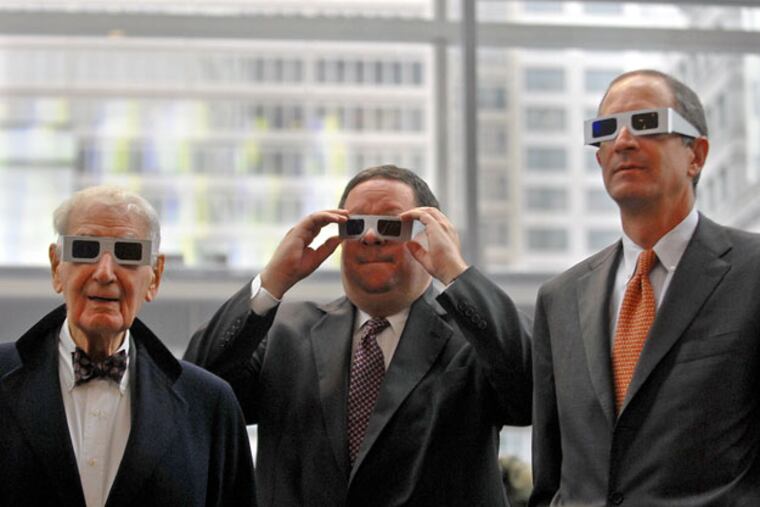Will David L. Cohen do with the people of Philadelphia what he did with Comcast?
Cohen’s decision to start disengaging at Comcast has some Philadelphians hopeful he will redirect more energy to public purposes.

David L. Cohen is a little tough on the other people who run Philadelphia.
Check out his interview with fellow lawyer Ajay Raju, whose gentle 6ABC talk was released on Sunday, days before Comcast Corp. announced that Cohen was stepping down after 18 years as senior executive vice president and consigliere to its ruling Roberts family.
Raju called Cohen “eagle-like” and said he belongs on “Philadelphia’s Mount Rushmore.” But Cohen used the occasion to blame a “hostile” city government’s “anti-business” actions for having “cost us thousands if not tens of thousands of jobs” and making it “impossible for real developers” to build here.
Cohen blamed building-trades labor rates for scaring off affordable-housing projects. And he seemed to blame other Philly business leaders for not forming the kind of “active and aggressive business community” that keeps “bad, inappropriate” government actions off the books in cities like Cleveland and Detroit. He lamented the retirement of his long-ago boss, pro-business Mayor and later Gov. Ed Rendell.
He’s right about city government, at least. But some observers say that his role as a critic has gotten old and may have lessened his clout.
Indeed, Cohen’s stand-down was celebrated by some of his critics, one of whom claimed that even some at Comcast had grown “tired of David going off the cuff and being so negative,” and wary of his loyal support for Joe Biden’s Democratic presidential campaign, also based in Center City.
Cohen is admired by some of his peers for his rapid and clear synthesis of complex situations, his mastery of detail (“The man edits footnotes”), and his speed of execution of the plans he helps bosses form.
At Comcast, Cohen’s role included shepherding the grandiose acquisitions his boss Brian Roberts used to build the company as they moved past lawmakers, regulators, and an often skeptical public. The company won its initially hostile campaign for AT&T Cable in 2002, was rejected by Disney in 2004, ran the Washington gauntlet to win NBCUniversal in 2011, gave up on TimeWarner in 2015, and was outbid for Fox in 2018 before buying Europe’s Sky.
Lawyer Thomas J. Reid, the Scot who led the dozen blue-chip Davis Polk & Wardwell lawyers who helped craft Comcast’s Sky and Fox bids, took over Comcast corporate governance and legal work last spring. He inherits part of Cohen’s responsibilities, now that demands have grown far beyond the familiar Amtrak corridor where Cohen flourished and have become global. It’s the next generation’s turn.
Cohen spearheaded much of the work on the two Comcast towers, the only corporate skyscrapers built in Center City since the 1980s.
For most of his public career, Cohen has been an instrument of powerful bosses — Rendell and Roberts. On his own, what does he stand for?
He was tested way back in 2000, when Verizon executive Dan Whelan asked Cohen for help with a list of demands by then state sen. Vince Fumo, D-Phila. Whelan worried the demands were improper, and asked Cohen for advice. Instead of directing Verizon to law enforcement, Cohen and a colleague declined to review the list and suggested Whelan “find a way of working it out” with the senator, who was later convicted on federal corruption charges in a trial that featured Whelan’s testimony.
Cohen has been his own man as chairman of the board of trustees at Penn, his law school (he has also raised funds for his college, Swarthmore). He made a mark earlier as head of the Penn Medicine board, where his university board chair predecessor, James Riepe, credited Cohen with helping lead a financial reorganization that ended threatening deficits.
As chairman of the main trustee board, Cohen helped persuade Raymond Perelman to put his name on the medical school and the Robertses to fund the Proton Therapy Center.
Unlike at Temple, where the board has a reputation for taking an active role in university policy, Cohen has backed Penn president Amy Gutmann’s administration and shielded administrators from some board enthusiasms. On his watch, trustees set governance guidelines but managers manage, which includes implementing Cohen’s corporate-informed priorities in key areas such as operations management and IT security.
Cohen’s decision to start disengaging at Comcast has some Philadelphians hopeful he will redirect more energy to public purposes. Lance Haver, who as city consumer advocate challenged the Comcast cable agreements that Cohen negotiated, says he’s not bothered by Cohen’s attacks on city government’s leftward drift.
“Up until now, he has represented his clients,” Haver told me. “He has shown tremendous creativity in creating and manipulating structures that help his clients. He helped Comcast grow to a Top 100 company.
“Someone with David L. Cohen’s creativity and abilities, now that he’s no longer asked to see the world from that limited point of view of his clients, now that he will have a little more time to listen to more people, his opinion of what might be the barriers to progress might change. I hope he’ll be just as great for the rest of us.”